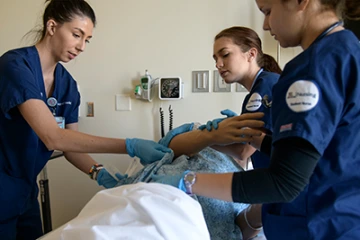Our Mission
To improve health and human potential by educating the next generation of health care
professionals, investigating and solving critical health care problems, providing compassionate and culturally sensitive care, and building healthier communities for all.
Our Values
Integrity
Being honest, respectful and just.
Compassion
Choosing to care.
Exploration
Being insatiably curious.
Adaptation
Being open-minded and eager for what's next.
Inclusion
Harnessing the power of diversity.
Determination
Bearing down.
Who We Are

Located on campuses across the state in Tucson, Phoenix and Gilbert, Arizona, the University of Arizona Health Sciences is one of the top-ranked academic medical centers in the southwestern United States.
U of A Health Sciences includes the College of Medicine – Phoenix, College of Medicine – Tucson, College of Nursing, Mel and Enid Zuckerman College of Public Health and R. Ken Coit College of Pharmacy.
Additionally, 12 centers are dedicated to excellence in cancer; neurodegenerative and respiratory diseases; precision health care; pain and addiction; biomedical informatics, health technology innovation and simulation training; and pandemic preparedness.
U of A Health Sciences employs approximately 3,000 people, has approximately 7,700 students and 900 faculty members, and garners more than $248 million in research grants and contracts annually.
Our History
Known for relentless curiosity, interprofessional collaboration, and the intentional inclusion of diverse perspectives and experiences, U of A Health Sciences had its beginnings on the U of A campus in Tucson and has since expanded statewide with a growing presence in the Phoenix metropolitan area, in rural and border communities, and beyond.
In 1967, the Basic Sciences Building of the College of Medicine (now College of Medicine – Tucson) opened its doors to the first class of UArizona medical students. Four years later, University Hospital (now Banner – University Medical Center Tucson) was completed as the primary teaching hospital for the College. These two entities were known as University Medical Center (UMC).
Within a few years, the long-established Colleges of Nursing and Pharmacy, which started in the College of Liberal Arts, constructed new buildings and joined the hospital and medical college on the budding UArizona Health Sciences campus.
In 1973, the College of Nursing organized its first nursing research conference, which has grown from a local gathering to an international symposium. It was one of the first such conferences in the United States. A few years later, the college organized its PhD program, graduating 17 doctoral students over the next 10 years.
In 1994, the U of A Health Sciences Phoenix Campus was established to meet the needs of U of A medical students in Maricopa County and to provide education and community outreach to the surrounding region. In 2000, the Mel and Enid Zuckerman College of Public Health became the fourth college on the U of A Health Sciences campus in Tucson.
Four years later, University Physicians assumed management of Kino Community Hospital in Tucson, which was renamed University Physicians Hospital. In 2010, University Physicians Hospital was renamed the Banner – University of Arizona Medical Center Tucson, and in 2015, the University Medical Center South Campus was renamed Banner – University Medical Center South Campus when Banner – University Medical Group assumed management of the hospital.
In 2007, the College of Medicine – Phoenix admitted its inaugural class of 24 first-year medical students. In 2009, the College of Public Health founded the Global Health Institute to address health disparities and offer solutions through education, research and health diplomacy.
In 2010, the integration of UMC, UPH and their clinical affiliates resulted in the umbrella organization, the University of Arizona Health Network. Five years later, U of A and Banner Health finalized the terms of a 30-year academic affiliation agreement that provides significant capital and investment resources for improvements to clinical facilities, equipment, and clinical research and education programs.
Also in 2015, U of A Health Sciences secured continued growth of the Phoenix Biomedical Campus (now the Phoenix Bioscience Core). The Phoenix City Council gave approval to a five-acre expansion of the campus with U of A holding an exclusive 10-year window to develop this parcel.
U of A Health Sciences and Banner Health received a $9 million award from the National Institutes of Health for the All of Us Research Program in 2018. The program, which will receive $60 million over five years, represents the largest NIH award in Arizona history and is tied to an effort to enroll 1 million or more participants across the country.
Two years later, U of A Health Sciences surpassed the $200 million milestone in research funding in fiscal year 2020, while addressing some of the world’s most challenging health conditions, including COVID-19.
In 2021, alumnus R. Ken Coit committed $50 million through his family foundation to solidify U of A Health Sciences’ place as a leader in pharmaceutical education, research and innovation. The R. Ken Coit College of Pharmacy bears his name in recognition of this gift.

